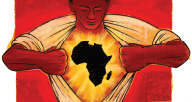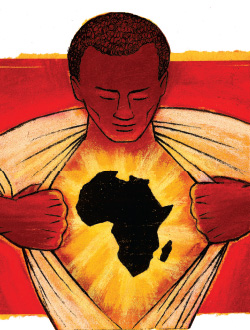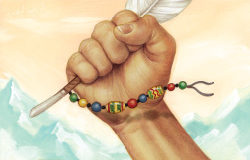“Post-Mandela Africa…

Daniel Didier Preira
…doit définir une vision et stratégie collectives pour sortir du sous-développement, de l’instabilité, de l’état de guerre cyclique et de la dépendance économique qui entravent l’épanouissement des populations africaines. Les dirigeants africains, pour être fidèles à et dignes de l’héritage symboliquement fort de Nelson Mandela, ont ainsi un devoir d’union et une responsabilité d’unité effective pour assurer la paix, la stabilité et le bien-être du continent. Cela passera, entre autres, par le courage politique de renforcer l’Union africaine et la Commission de l’Union africaine pour en faire, au-delà d’une simple profession de foi, de véritables instruments d’intégration; la mise en place de mécanismes de coordination d’une monnaie africaine, d’une banque centrale africaine et d’un fonds monétaire africain au service du développement économique et de la diplomatie africaine; l’accélération de l’harmonisation effective de la liberté de circulation dans l’espace africain; le renforcement de l’État de droit et de la transparence; la priorisation de l’industrialisation et du développement des capacités productives des différents pays africains; le transfert des richesses tirées des matières premières vers l’amélioration du pouvoir d’achat et la création d’emplois décents dans tous les pays de l’espace africain afin d’inverser le flux migratoire vers les autres continents; et la réalisation de programmes de développement humain, de science et de technologie au diapason de la diversité culturelle, économique et technique de l’Afrique et du monde.
Cela semble relever d’une utopie, mais n’oublions pas que Nelson Mandela a rendu l’impensable possible. Il reste alors à ses pairs héritiers de rendre réalisable cet espoir fabuleux de voir l’Afrique être une actrice véritable de la marche du monde, une puissance politique, diplomatique et économique, et non plus simplement un marché».
» Daniel Didier Preira, Juriste principal au cabinet d’avocats Ferdi-Martin, est ancien Greffier adjoint de la Cour pénale internationale et Chef de la Section des conseils de la Défense et de l’administration pénitentiaire du Tribunal pénal international pour le Rwanda.
Vinodh Jaichand
…is searching for real leadership. One of the most inspirational leaders in the world has left us groping for a better understanding of the adage “a life worth living.” His death left large numbers mourning for their personal losses, with open outpouring of unbridled emotion in public where they gathered to celebrate his life. His capacity for forgiveness was astounding, and his death left us with the opportunity to re-evaluate ourselves, as well as the current calibre of leadership in Africa. A quick conclusion might be that few can measure up or currently indicate the potential to do so. It is ironic that his values were forged in the cauldron of unfair society. Yet, in far better times, our leadership regresses, and fails by paying homage to populism or demagoguery.
The fact that 37 states on the African continent today have laws that discriminate against a person’s sexual preference – because it is ‘un-African’ – reminds us of Nelson Mandela’s trial speech where he reiterated his fight against domination, white or black. We can almost hear him including the domination of homophobia – in yet another example of lived leadership – if he were alive today. He would castigate that practice and call leaders to account. Few in history could do that without inviting a barbed response in return. He could do it because of the esteem in which everyone held him.
Nelson Mandela was the world’s hero, and we responded to him because of the lifelong sacrifice that he made for a people – his people. As a result, we thought him to be the ultimate public servant. Today, African leadership is recognized through the cult of personalities who demand our respect, but never earn it. They take large advertisements in local and national newspapers to remind us of what they do for us, without any acknowledgement that this is their designated job. Long cavalcades of blue flashing lights remind us that someone important might be travelling on the same road as us, without any recollection that our taxes pay for that privilege. Framed pictures of government officials adorn most government offices that deliver few tangible results, except more corruption.
The duty of public officials appears only in election manifestos, but is never practiced as service due to the people. Alas, low quality leadership is not just the feature of Africa, but a reality on every continent today. And so it will be some time yet before another Mandela arrives.”
» Vinodh Jaichand is the Dean of the School of Law, University of the Witwatersrand, Johannesburg. The views expressed herein are his own.
Ababacar Mbengue
…is at a crossroads. The question is no longer how far Africa has travelled since the days of slavery, colonialism and apartheid, but rather which strategic decisions it has to take.
Several international magazines have devoted their covers to the economic awakening of Africa, and predicted that seven of the 10 largest global economic growth stories for countries over the next five years will be in Africa. The IMF predicts growth of six percent in 2014 for the continent.
However, Africa faces many challenges. First, its growth is mainly based on the export of its abundant raw materials, and the continent has proven incapable of creating sustainable jobs. More importantly, according to one UN screenplay, the African population could more than quadruple this century, from 800 million in 2000 to 3.6 billion in 2100. While one in seven people now lives in Africa, it will probably be one in four in 2050, and perhaps one in three in 2100. The increase will be particularly significant in Sub-Saharan Africa, where the population could grow from a little less than 700 million in 2000 to nearly 3.4 billion in 2100.
This African demographic reality is almost always exclusively presented in the negative – poverty, conflict, insecurity, disease – obscuring the tremendous social, cultural, scientific, political, economic and commercial potential suggested by this population growth. By 2050, Africa will have the greatest potential among all continents in respect of its young and dynamic labour force. Ascribing proper value to this enormous potential is an imperative for Africa’s politicians. Africa’s collective responsibility, on this logic, involves a duty to educate and train the population so that it becomes a powerful lever for the emergence of sustainable prosperity leading to a larger middle class, higher standards of living, and enduring social peace and stability.”
» Ababacar Mbengue is a professor of strategic management at the University of Rheims in France, and founder of the Society for African Management.
Jakkie Cilliers
…is changing. Work done by the African Futures project at the Institute for Security Studies in partnership with the Frederick S. Pardee Center at the University of Denver suggests that the African economy as a whole will grow at an average rate of 5.6 per cent between 2010 and 2050. This will be significantly faster than our forecast of a global growth average of slightly below three percent per annum for that same period.
The forecast of generally higher rates of growth in Africa has, in recent years, received considerable public and analytical attention. The possible reasons for the improvements include Africa’s population dividend, evidence of more responsible macroeconomic management and reform, improved agricultural output and industrial management, more stable political frameworks, more effective aid, targeted debt relief and increased domestic revenues, growth in remittances and foreign direct investment, the rise of the South (China in particular), and the extent to which Africa has been able to benefit from the commodities boom. Except for Angola and, eventually, Ethiopia, growth will be faster in smaller economies and countries with smaller populations. Bref, during this period, the size of the African economy will increase almost nine-fold in market exchange rate terms (from around US$1.2 trillion in 2010 to $3.5 trillion by 2030, and $11 trillion by 2050).
Much as there is well-deserved excitement about the rise of Africa, it is important that these future growth prospects be placed in context, for the continent’s relative size as part of the global economy will continue to remain modest. Africa currently constitutes approximately 2.5 percent of the global economy, and this figure will have increased to roughly 3.8 percent by 2030 and 6.5 percent by 2050. Despite substantial reductions in the percentage of Africans living in extreme poverty – that is, Africans at income levels below US$1.25 per day – the momentum of Africa’s population growth is such that the continent would not be able to even approximate the goal of effectively eliminating poverty by 2030, as envisioned in the post-2015 Millennium Development Goals.
While we expect democracy to expand and governance to improve, structural forces – such as the African youth bulge, high rates of urbanization and unemployment – imply continued elevated levels of turbulence. If they are able to make the best of their future, Africans in the post-Mandela era will require inspirational leadership, reconciliation and vision of the kind that Mandela and F.W. de Klerk were able to offer South Africa.”
» Jakkie Cilliers is the Executive Director of the Institute for Security Studies in Pretoria.
Sello Hatang
…in the company of a great legacy.
This is a time of reflection. We remember those who sacrificed so much to bring us democracy. We salute those who work tirelessly to build it. And we commit ourselves, in the name of Nelson Mandela’s legacy, to growing democracy through the promotion of social justice.
As we progress in actively addressing and learning from the legacy of apartheid, we are drawing deeply on the experience of those who learned before us. Still, we need to embrace our own futures.
This journey is our shared responsibility as we navigate through the excitement and complexity of a collective past and, simultaneously, today’s global, modern world. Madiba’s legacy transformed contestants into stakeholders. It was and is about acknowledging and recognizing turning points and the opportunity to effect change.
We need to be both visionaries and realists – committed to change, but concerned with the practical implementation of our vision.
The achievement of our shared goals depends ultimately on our success – in collaboration with others – in placing the interests and needs of developing countries and their citizens at the top of the world agenda, and in promoting positive change driven by democratic principles as global participants. In so doing, we will continue to create the basis for cooperation between nations and people.
If we are to build an empowered, fair, inclusive and productive citizenry, social justice is an absolute necessity. This needs to be driven through the values of leadership, community, equality, dignity and integrity as catalysts of socioeconomic transformation.
The touchstone of Nelson Mandela’s legacy – the greatness of his leadership promise – is that leadership is not confined only to the privileged members of society, but is the responsibility of ordinary people as the makers of history.
Madiba aptly said: “The foundation has been laid – the building is in progress. With a new generation of leaders and a people that rolls up its sleeves in partnerships for change, we can and shall build the country of our dreams!”
» Sello Hatang is the Chief Executive of the Nelson Mandela Foundation.












